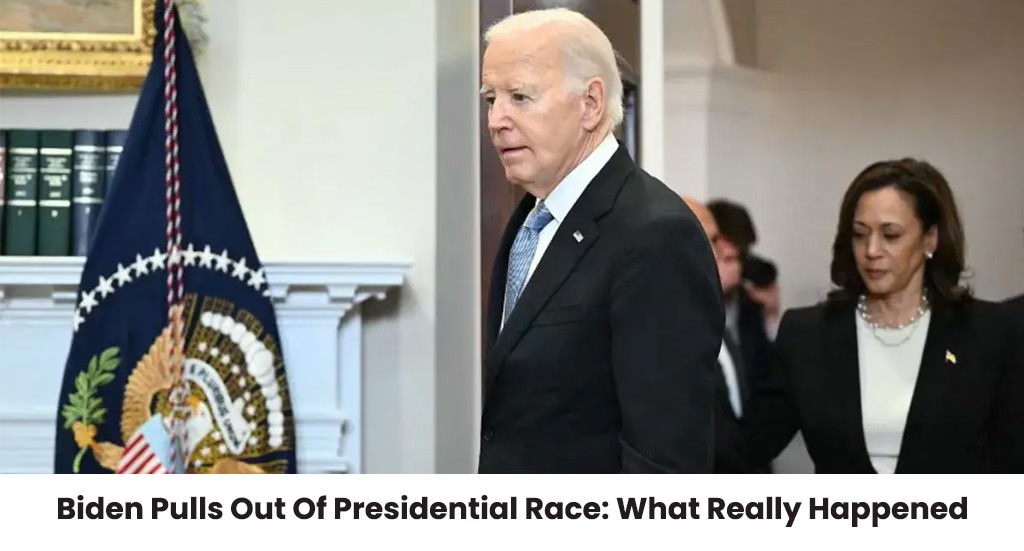On July 21, U.S. President Joe Biden announced he would not seek reelection in 2024, ending his campaign amidst internal pressure within the Democratic Party. He stated he will serve as President until January 2025 and plans to address the nation soon. Within half an hour of his announcement, Biden endorsed Vice President Kamala Harris for the Democratic nomination, solidifying her position as the party’s future leader.
However, Joe Biden cannot independently appoint the next Democratic nominee; delegates and super delegates at the DNC will decide. Other potential candidates include Pete Buttigieg, Gavin Newsom, JB Pritzker, Gretchen Whitmer, and Josh Shapiro.
“It has been the greatest honour of my life to serve as your president. And while it has been my intention to seek re-election, I believe it is in the best interest of my party and the country for me to stand down and focus solely on fulfilling my duties as president for the remainder of my term. I will speak to the Nation later this week in more detail about my decision.”
Joe Biden faced significant pressure to withdraw from the presidential race following a poor debate performance against Donald Trump. After initially attributing his performance to jet lag, Biden changed his stance amidst concerns over his mental acuity. 36 congressional Democrats publicly urged him to drop out, fearing electoral losses. Following consultations with top advisors and meetings over the weekend, Biden announced his decision on Sunday afternoon. He informed Vice President Kamala Harris personally and met with key figures like White House chief of staff Jeff Zients and campaign chair Jen O’Malley Dillon before formally announcing his withdrawal around 2:30 pm.
Possible Reasons Behind this Drop
Joe Biden’s presidential campaign faced numerous challenges that ultimately led to his decision to drop out of the race. Despite his extensive political experience, Biden struggled to gain traction in polls, falling behind competitors who appealed more to voters seeking a fresh face. Fundraising efforts were insufficient, limiting his campaign’s ability to organise and advertise effectively against better-funded opponents. Internal conflict within the Democratic Party further hampered Biden’s efforts, creating a divisive environment that undermined his candidacy.
Rumours of scandal, though unsubstantiated, tarnished Biden’s reputation and fuelled negative media coverage. At 81, concerns about Biden’s age and health persisted throughout his campaign, contributing to doubts about his stamina and cognitive abilities. Lacklustre debate performances failed to impress both pundits and the public, highlighting weaknesses rather than strengths. Internal turmoil, marked by key staff departures, signalled deeper issues within his campaign organisation.
The loss of high-profile endorsements further eroded Biden’s support base. Ultimately, faced with these formidable challenges and a realisation of his campaign’s struggles, Biden made the difficult decision to withdraw from the presidential race.
The Chain of Events that Led to Biden’s Exit
- In April this year, Joe Biden told radio show host Howard Stern that he would debate Trump. According to Reuters, Biden was exhausted after flying to Europe twice and to the West Coast over a 14-day period, followed by only a few days of rest at his vacation home in Rehoboth Beach, Delaware. On June 21, Biden and his aides went to Camp David for focused preparation sessions.
- On June 27, during the US presidential debate, Biden fumbled for words and lost his train of thought. Officials reported that Biden had a cold at the time. Throughout the 90-minute debate, Trump repeated several glaring falsehoods, including claims that he had won the 2020 election. Biden failed to refute these claims, leaving sentences and thoughts incomplete.
- The day after the debate, Biden acknowledged his poor performance and admitted that he was no longer a young man. On July 2, he mentioned that he had almost fallen asleep on stage. Calls for Biden to step down began immediately after the debate, with Biden’s aides reaching out to worried Democrats facing re-election campaigns in the following days.
- On July 13, Trump was shot while delivering a speech in Pennsylvania. The bullet grazed his ear and bloodied his face, and photos of the former president holding up his fist in defiance were widely circulated. A few days later, Biden was diagnosed with Covid-19 while campaigning in Nevada. While recuperating at his home in Rehoboth Beach, Delaware, he had time to consider whether and how to end his campaign.
- On July 21, Joe Biden ended his re-election campaign after fellow Democrats lost faith in his mental acuity and ability to beat Trump. He announced his decision in a letter posted on social media and subsequently endorsed Vice President Kamala Harris as the party’s candidate. Representative Scott Peters, Democrat of California, was quoted as saying that he had lost confidence in Biden’s candidacy. Minnesota Rep. Angie Craig echoed his views, asking the President to exit the race.
- In his closing note, Biden expressed gratitude for the support he had received throughout his political career and emphasised the importance of unity within the Democratic Party. He pledged to work tirelessly to ensure a smooth transition and to support Kamala Harris in her campaign. Biden reiterated his commitment to the values and principles that guided his presidency and vowed to continue advocating for the American people in any capacity he could.
Now, only time can tell what will happen in the coming elections but surely has gotten people interested in it big time.








